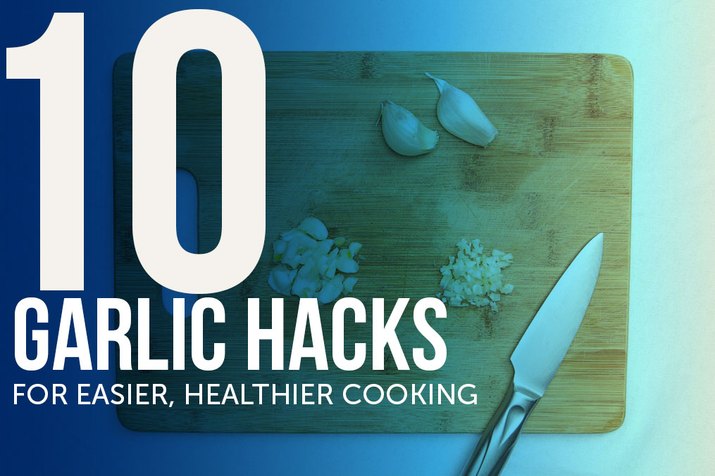
Overview
There it is, sitting on your shelf next to that old box of sea salt, a smelly little wonder substance that has been thought to help people avoid certain types of cancer, lower their cholesterol and amp up their immune systems during flu season. We speak of garlic, the beloved stinking rose and global-cuisine superstar. "Garlic is one of nature's best medicines," says Courtney Abrams, a health coach at Roslyn Wellness. "It contains a chemical called allin, which when chewed converts into allicin, an acidic compound that reacts with free radicals (those byproducts of digestion that mess with our DNA and cellular membranes) and destroys them." Some people should use it carefully: Avoid it if you are taking blood-thinning medication or are prone to stomach ulcers. Here are 10 hacks for getting the most out of your garlic, retaining its therapeutic properties and preparing it more easily.
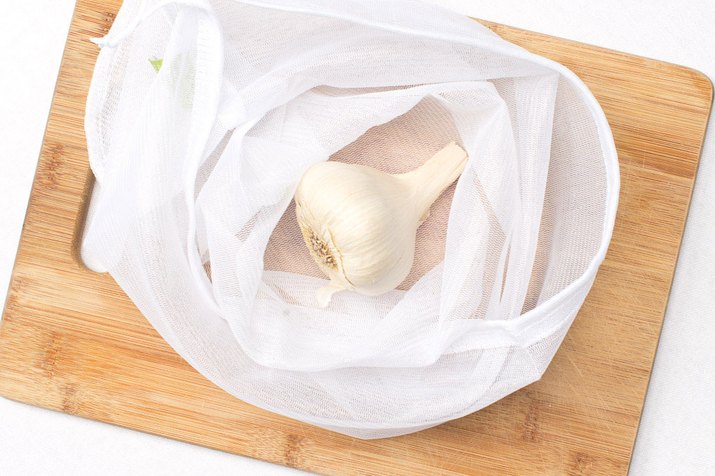
1. Store It in a Cool, Dark, Dry Place
When it comes to storing, garlic has two natural enemies: moisture and sunlight. You're better off leaving unpeeled garlic on the shelf and out of the cold, as freezing and refrigeration will add moisture to the garlic. Abrams recommends storing garlic in a dry, cool place -- and make sure your garlic is well ventilated in a mesh bag or wire basket. Garlic kept in a cool, dark, dry conditions should last three to five months.
Related: 8 Easy Eco-Friendly Food Swaps You Can Make Today
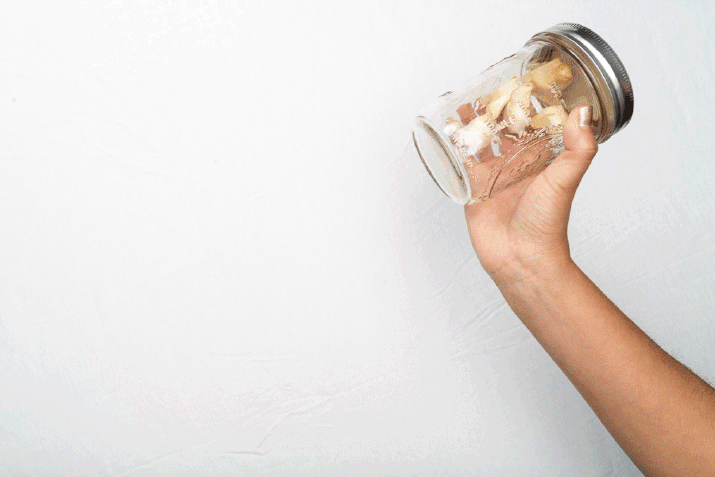
2. Peel a Bunch of Cloves Quickly With the Shake Trick
Restaurant chefs have known for years that the easiest (and most fun) way to peel a bunch of cloves of garlic at one time is to shake them vigorously. First, smash the whole bulb of garlic, shoot-side up, with the heel of your hand to separate the bulbs. Toss the cloves in a glass jar with a screw-on lid or place in a bowl and cover with another bowl or hard lid, then act like you are mixing James Bond's favorite cocktail. The shaking should separate the skins from the cloves within 15 seconds, but take note of hack No. 1: This works best with dry garlic.
Read more: Bulletproof's Dave Asprey on How to Biohack Your Best Self
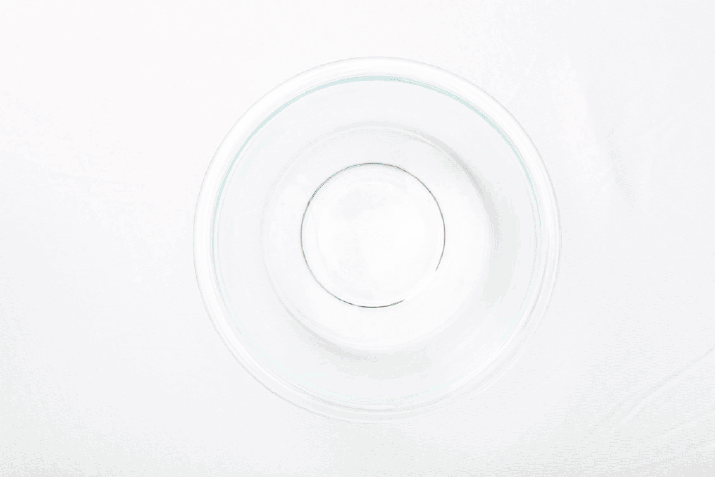
3. Peel a Few Cloves Quickly With Hot Water
Instead of crushing each clove one by one and then peeling them, a quick way to rid your garlic of its skin is to drop the loose cloves in a cup of hot water. Then continue your meal prep and, after a few minutes, remove the garlic, let it cool and easily lift off the skins.
Related: 9 Egg Breakfasts in 10 Minutes or Less
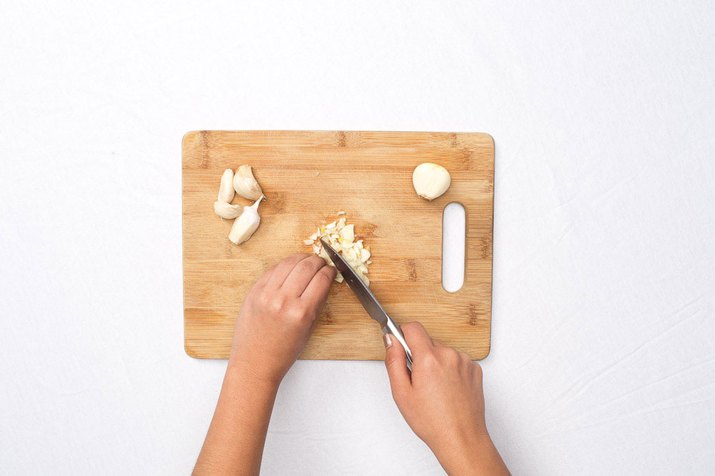
4. Mince to Make It Stronger -- Slice to Keep It Milder
The more that you break up raw garlic by crushing or finely chopping it, the more you release the sulfuric compounds and essential oils that give it its familiar sting. So mincing, crushing or pureeing it will bring the pungency of raw garlic to the fore, while slicing it thick keeps things on the milder side.
Related: 6 Quick and Easy 3-Ingredient Party Snacks

5. Allow It to Rest Before Cooking With It
It's smart to let your garlic sit a good 5 to 15 minutes after cutting or crushing it before you eat or start cooking with it. "The exposure triggers an enzyme reaction that will boost the healthy compounds in garlic," says Abrams.
Related: The 14 Best Foods for Stress Relief (INFOGRAPHIC)
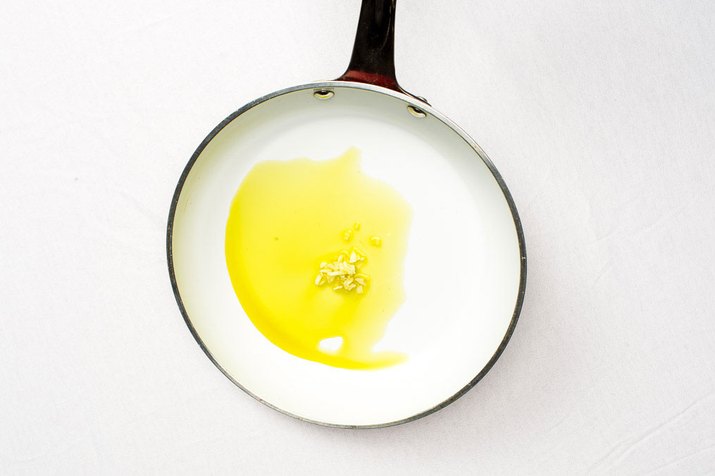
6. Don’t Let Your Garlic Brown
Sauteeing minced garlic can be tricky because it cooks so quickly, which can leave your garlic burned and acrid-tasting. If you're cooking garlic by itself or before adding other ingredients, use a low temperature and add the minced garlic before the oil starts smoking. Otherwise, a good rule of thumb is to cook other aromatics like onions or leeks first, and then add the garlic after the onions have sweated and become translucent. In order to maximize its nutritional value, you don't want to cook it for too long. So Abrams suggests crushing it first, letting it sit and then tossing it into your dish toward the end of your cooking time.
Related: 8 Vegan Foods That Aren't as Healthy as You Think
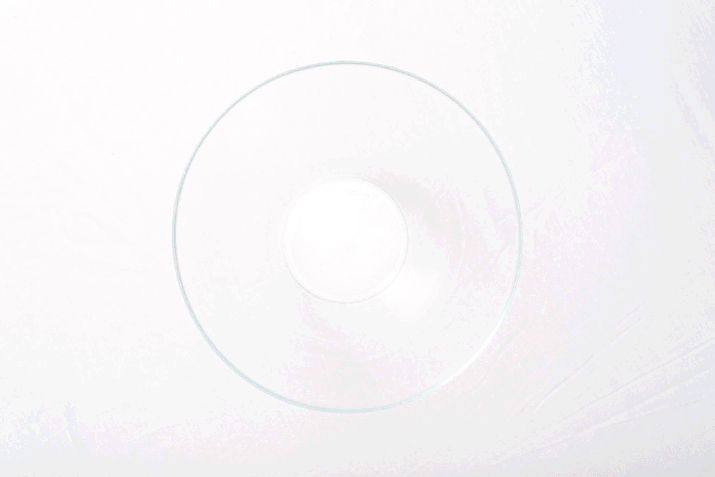
7. Rub a Bowl With Raw Garlic for Mild Seasoning
Here is an old chef's trick for adding garlic's zest to your salad without overwhelming your vinaigrette with its pungency. Cut a clove in half and rub both halves around the empty salad bowl before adding the greens and dressing. This technique works particularly well for Caesar salads, but you could also use it to flavor a bowl of rice or a Buddha bowl.
Related: 7 Simple Buddha Bowls You Can Actually Make Tonight
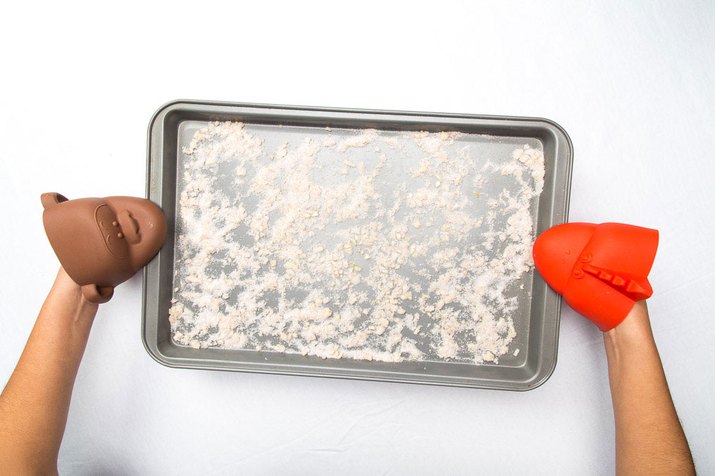
8. Make Your Own Garlic Salt or Powder in the Oven
A good garlic-based spice rub can really wake up the flavor of roasted and grilled foods, but processed garlic powders and garlic salt can quickly lose their flavor and contain preservatives. For fresh DIY garlic salt, preheat the oven to 180 degrees. In a food processor pulse a head of peeled garlic with a cup of kosher salt for about 20 seconds before spreading the mixture evenly on a baking sheet and sticking it in an oven. Once the garlic has dried -- about one hour -- take it out and toss it into the processor to break up the chunks. For fresh garlic powder, thinly slice eight to 10 cloves and lay them out on a parchment-lined cookie sheet and bake in a 150-degree oven (or the lowest your oven will preheat to) until the garlic is dry but not brown -- about 90 minutes to two hours. Then grind it in a spice grinder, food processor or mortar and pestle. Kept in an airtight container and away from moisture, your homemade garlic powder or garlic salt should keep for several months.
Related: 3 Fresh & Fruity Treats That Are Packed With Nutrients
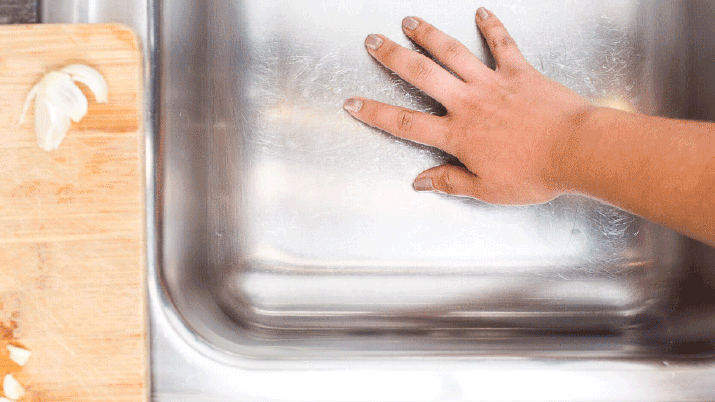
9. Rub Stainless Steel to Remove a Garlic Smell
What's just as bad as kissing someone with garlic breath? Being touched by someone who has been working with the stuff, especially near your eyes. Fortunately, the perfect thing for getting the garlic stink off your fingers is right there next to your cutting board: stainless steel. Steel molecules bind with the sulfur residue that garlic leaves behind on hands, removing it from your skin, so just rub your fingers on the bottom or sides of a stainless-steel sink or faucet neck for a few seconds to get rid of stinky digits. (The same technique can also work for onions and fish).
Related: 10 Ways to De-Junk Your Diet
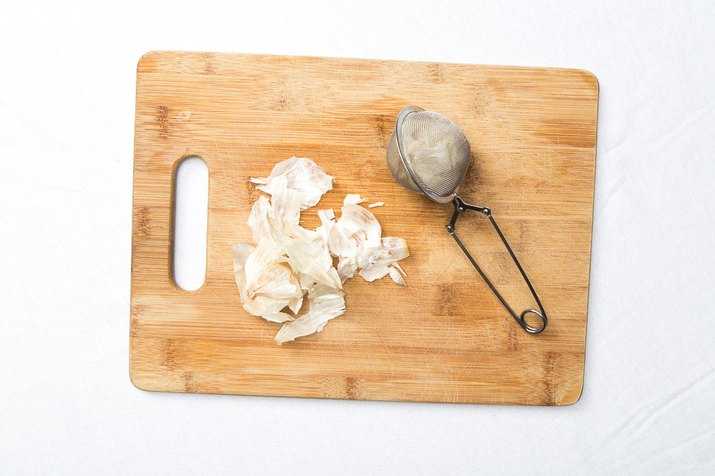
10. Save and Reuse Garlic Skins
Garlic skins are good for more than just your compost bin. In fact, they contain many of the same antioxidant compounds that make the cloves a health powerhouse. Stuff them in a tea strainer to make a cup of immune-boosting tea that you can flavor with honey and lemon. Or freeze them, and when you have enough, use them to flavor bone stocks or, along with other aromatics, a vegetable stock. Rinse the skins before use in order to remove dirt. We recommend using organic garlic to avoid ingesting pesticides used in some conventionally grown garlic.
Related: How to Get the Facts on Food Labels
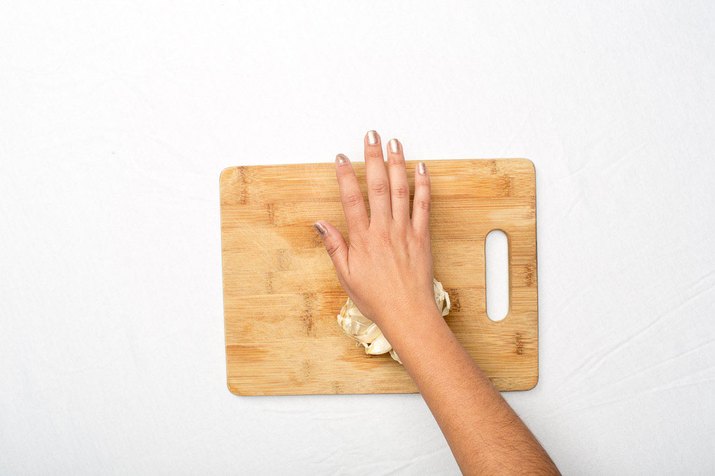
Name This Hack!
Can you figure out which hack-inside-of-a-hack is shown in this picture? Do you have any additional tips for cooking with garlic? Tell us in the comments below!
Related: 13 Weight Loss Breakfasts Recipes
Garlic is a common ingredient in many dishes, but chopping or mincing garlic every time you want to use it can be time-consuming. By mincing garlic ahead of time and freezing it, you will have the right amount ready whenever you need it. Be careful when purchasing large amounts of garlic to mince and freeze, as each bulb of garlic contains 10 or more cloves, and most dishes call for only a few cloves of garlic. Unless you intend to eat garlic every night, you may want to try freezing just one or two bulbs to start.
Step 1
Separate the cloves from your garlic bulb by placing the bulb on a cutting board with its root facing down. Press down on the bulb with your hand until the cloves separate.
Step 2
Peel the garlic cloves by laying them on a cutting board, flat side down. Lay a large kitchen knife on top of the clove, and then quickly smash the knife with your hand. The skin should fall right off the clove.
Advertisement
Video of the Day
Step 3
Cut off the end of the clove where it attached to the garlic bulb, and then throw away the end and skin.
Step 4
Slice the garlic cloves into halves or quarters. Add two parts garlic and one part oil to your blender. Olive oil works well and will prevent the garlic from freezing into a solid mass.
Step 5
Scrape the contents of the blender into a plastic airtight container suitable for freezing. Immediately place the container into the freezer. Alternatively, you can freeze teaspoon-sized mounds of garlic on parchment paper, and then toss them all into a plastic freezer container. This allows you to pull out a standard serving size individually.
Things You'll Need
Cutting board
Large kitchen knife
Blender
Olive oil
Plastic container approved for freezer use
Parchment paper
Video of the Day